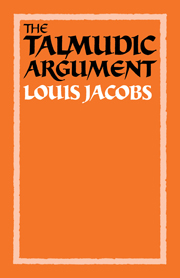Book contents
- Frontmatter
- Contents
- Preface
- Note on transliteration
- Note on Biblical translations
- Note on the Babylonian Talmud
- List of Abbreviations
- 1 The Talmudic argument
- 2 The literary form of the Babylonian Talmud
- 3 Berērah: retrospective specification
- 4 Yeúsh she-lo mi-da‘at: unconscious abandonment of property
- 5 Rubba: probability
- 6 Davar she-lo ba le-'olam: conveyance of a thing not yet in existence
- 7 Kol she-eyno be-zeh aḥar zeh afilu be-vat aḥat eyno: whatever cannot be established in a consecutive sequence cannot be established even in a simultaneous sequence
- 8 Yesh ḥoresh telem eḥad: a single act of ploughing can result in a number of penalties
- 9 Simanin de-oraita o de-rabbanan: whether reliance on distinguishing marks for the purpose of identification is Biblical or Rabbinic
- 10 Devarim she-be-lev eynam devarim: mental reservations in contracts are disregarded
- 11 Ḥazakah: presumptive state
- 12 Gadol kevod ha-beriot: the law and regard for human dignity
- 13 Hazmanah milta: whether the designation of an object for a particular use is effective
- 14 Mitzvat ‘aseh she-ha-zeman geramah: positive precepts dependent on time from which women are exempt
- 15 Heyzek she-eyno nikar: indiscernible damage to property
- 16 Kinyan ḥatzer: acquisition by means of a domain
- 17 Palginan be-dibbura: admission of part of a testimony even though another part of the same testimony is rejected
- 18 Tadir u-mekuddash: which takes precedence: the more constant or the more sacred?
- 19 Palga nizka: the nature of the payment of half-damages to which the owner of a goring ox is liable
- 20 Patur mi-diney adam ve-ḥayyav be-diney shamayim: cases where there is liability in the eyes of God even though the human courts cannot enforce payment
- 21 Maḥal ‘al kevodo kevodo maḥul: renunciation of honour by one to whom it is due
- 22 Conclusions
- Glossary
- Bibliography
19 - Palga nizka: the nature of the payment of half-damages to which the owner of a goring ox is liable
Published online by Cambridge University Press: 06 January 2010
- Frontmatter
- Contents
- Preface
- Note on transliteration
- Note on Biblical translations
- Note on the Babylonian Talmud
- List of Abbreviations
- 1 The Talmudic argument
- 2 The literary form of the Babylonian Talmud
- 3 Berērah: retrospective specification
- 4 Yeúsh she-lo mi-da‘at: unconscious abandonment of property
- 5 Rubba: probability
- 6 Davar she-lo ba le-'olam: conveyance of a thing not yet in existence
- 7 Kol she-eyno be-zeh aḥar zeh afilu be-vat aḥat eyno: whatever cannot be established in a consecutive sequence cannot be established even in a simultaneous sequence
- 8 Yesh ḥoresh telem eḥad: a single act of ploughing can result in a number of penalties
- 9 Simanin de-oraita o de-rabbanan: whether reliance on distinguishing marks for the purpose of identification is Biblical or Rabbinic
- 10 Devarim she-be-lev eynam devarim: mental reservations in contracts are disregarded
- 11 Ḥazakah: presumptive state
- 12 Gadol kevod ha-beriot: the law and regard for human dignity
- 13 Hazmanah milta: whether the designation of an object for a particular use is effective
- 14 Mitzvat ‘aseh she-ha-zeman geramah: positive precepts dependent on time from which women are exempt
- 15 Heyzek she-eyno nikar: indiscernible damage to property
- 16 Kinyan ḥatzer: acquisition by means of a domain
- 17 Palginan be-dibbura: admission of part of a testimony even though another part of the same testimony is rejected
- 18 Tadir u-mekuddash: which takes precedence: the more constant or the more sacred?
- 19 Palga nizka: the nature of the payment of half-damages to which the owner of a goring ox is liable
- 20 Patur mi-diney adam ve-ḥayyav be-diney shamayim: cases where there is liability in the eyes of God even though the human courts cannot enforce payment
- 21 Maḥal ‘al kevodo kevodo maḥul: renunciation of honour by one to whom it is due
- 22 Conclusions
- Glossary
- Bibliography
Summary
The sugya is Bava Kama 15a–b. Based on Exodus 21: 35–6, a distinction is made between an ox that has only gored once or twice and an ox that has gored three times. The former is known as tam (‘docile’, ‘tame’), the latter as mu'ad (‘warned’, ‘an habitual gorer’). If a mu'ad gores another animal the owner of the goring ox has to pay the full amount of the damage but the owner of a tam that gores only has to pay a half of the damage. A second distinction between the two is that the owner of a mu'ad is liable to make good the damage out of his own pocket, irrespective of the value of his ox, but the owner of the tam is only liable to pay out of the value of his ox. If the goring tam is not worth half the amount of the damage the owner is not obliged to make good the remainder out of his own pocket. A further law on which our sugya is based makes a general distinction between payment that is for the purpose of compensation and payment that is for the purpose of imposing a fine. The former is known as mamona, ‘money’, i.e. an amount to which a victim is entitled because of his loss. The latter is known as kenasa, ‘a fine’, the purpose of which is not to compensate the victim but to penalise the victimiser. For example, if a man steals another's property and is later found out, he has to pay double the amount he had stolen.
- Type
- Chapter
- Information
- The Talmudic ArgumentA Study in Talmudic Reasoning and Methodology, pp. 182 - 190Publisher: Cambridge University PressPrint publication year: 1984



